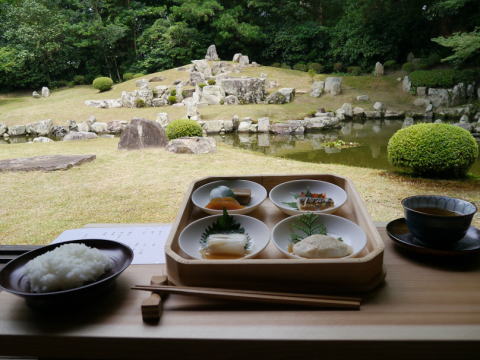Masuda City Tourist Information Center
Mail:info2@masudashi.com
〒698-0024 17-2 Ekimae-cho Masuda-shi Shimane Japan
中世の食Cuisine from the Medieval Era

Cuisine from the Medieval Era
Masuda City’s Hospitality Strategy
In 1568, Masuda Fujikane, who was lord of Masuda, and his son, Masuda Motoyoshi,
visited Yoshida Koriyama Castle (in present-day Akitakata City, Hiroshima
Prefecture). The castle was the base of Mori Motonari, an influential warlord
during Japan’s Medieval (Sengoku) period. There, the Masudas presented
many gifts and a lavish feast. With this gesture, the father and son succeeded
in leaving Mori with a strong impression of their power.
Masuda, a city with the flavor of medieval culture
The Masuda family’s documents include a record of the list of dishes served
to Mori Motonari and their ingredients. The Masuda Medieval Cuisine Reproduction
Project aimed to reproduce those dishes based on the record. Local historical
documents, represented by the Masuda family’s documents, have revealed
reliable facts concerning the historical background against which those
dishes were prepared for the leading warlord.
Masuda retains various historical buildings: the remains of the Masuda
family’s Nanao Castle and the Miyake-odoi residence building (collectively
designated as an historic site entitled The Remains of the Masuda Family
Castle and Residence), the remains of the port town, old Shinto shrines
and Buddhist temples. This is why Masuda is known for clearly displaying
what a medieval castle town was like, and it retains the flavor of medieval
culture.
Reproducing
Masuda’s medieval feast
A replication of the feast that Masuda Fujikane
served to Mori Motonari was prepared using local specialty products. Especially
featured were rare ingredients from the sea, mountains and rivers, including flying
fish, sweetfish, and salt-pickled sweetfish roe. It is believed that the lavishness
of the feast amazed warlord Mori Motonari.
Among such fine ingredients, the most noteworthy were herring roe and kombu kelp produced in Hokkaido. These suggest, along with the tiger fur from the Korean Peninsula included among the gifts, that the Masuda family was active in trade across the Sea of Japan. Some historians have pointed out that the family had a disposition similar to that of sea lords.
| Price | \2,000(1,900) Admission Fee inclusive ( ):fees for groups more than 20 |
| Place | Manpukuji Temple |
| Limit of the number of attendee |
15-40 persons |
| Requied Time | 60 - 20 min. |
| Inquiry | masuda.shimane@gmail.com |